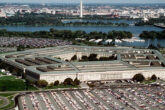February 28, 2021
Space Force Should Embrace the Natural Inclusivity of Space Nerds
The first black-white kiss on U.S. television occurred between Lt. Uhura and Captain Kirk, a controversial-for-1968 decision that reflected Star Trek creator Gene Roddenberry’s broader philosophical commitment to addressing race in his science fiction. This bold approach to diversity and inclusion is a fundamental element of the self-selecting group of space nerds that comprise the Space Force. As the newest service branch finds its feet, it should embrace this ethos — a proven aid to recruitment, readiness, and mission success — as fundamental to its identity.
As the newest service branch finds its feet, it should embrace this ethos — a proven aid to recruitment, readiness, and mission success — as fundamental to its identity.
Much of science fiction, from Jules Verne to Nnedi Okorafor, is predicated on a broad definition of diversity and inclusion. To be a space nerd, you have to extend diversity and inclusion considerations beyond intrinsic human demographic metrics – otherness is not just about race, age, sex, religion, and sexual orientation. Otherness in outer space is about different life forms, fundamental communication abilities, and competing values. I have been warned against proselytizing about science fiction when discussing Space Force matters because the general public may misunderstand the intent. But as a community of space nerds, we should acknowledge that our calling to space-related pursuits may also provide us a foundational advantage.
Read the full article from Defense One.
More from CNAS
-
The Department of Defense’s Breakthrough Nuclear Moment Risks Slipping Away
Unless they act, the Department of Defense’s breakthrough nuclear moment may vanish before it really happens....
By Will Rogers
-
DEFAERO Strategy Series [Apr 09, 25] CNAS' Becca Wasser and Phil Sheers on Revitalizing the U.S. Defense Industrial Base
On this episode of the Defense & Aerospace Report Strategy Series, sponsored by General Atomics Aeronautical Systems, Becca Wasser and Phil Sheers of the Center for a New Amer...
By Becca Wasser & Philip Sheers
-
From Production Lines to Front Lines
Executive Summary The U.S. defense industrial base (DIB) is struggling to meet the demands of the current strategic environment—let alone prepare for a potential conflict agai...
By Becca Wasser & Philip Sheers
-
The Pentagon’s Endangered Brain Trust
In this environment, sound assessments of emerging threats and new ideas to counter them will be especially vital....
By Dr. Andrew Krepinevich, Jr.




